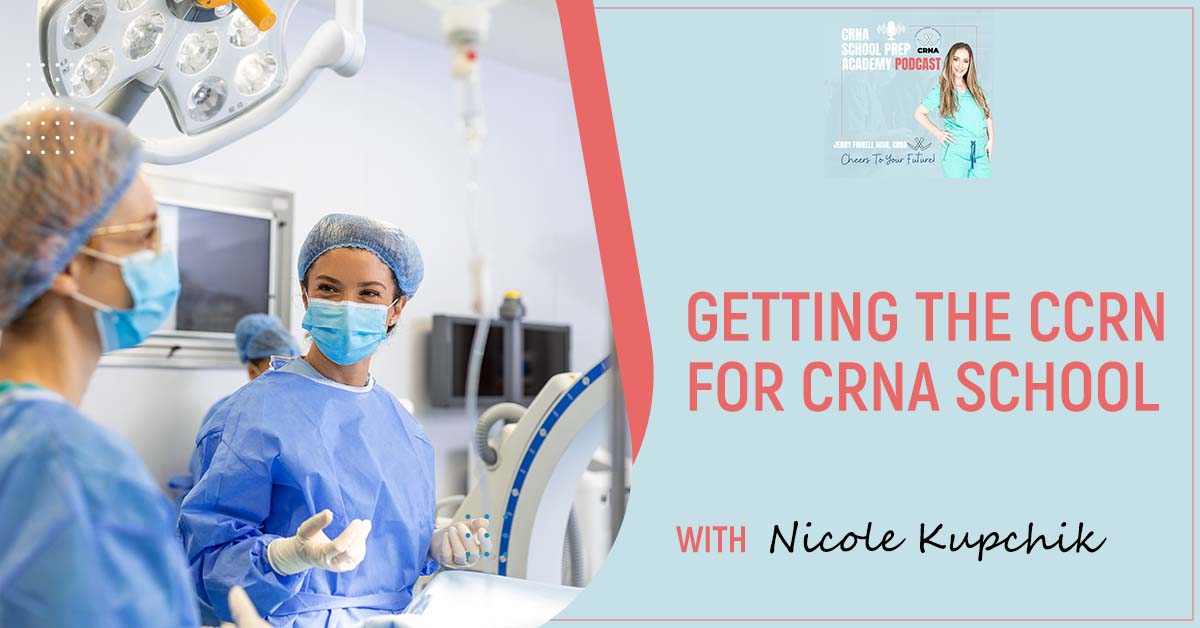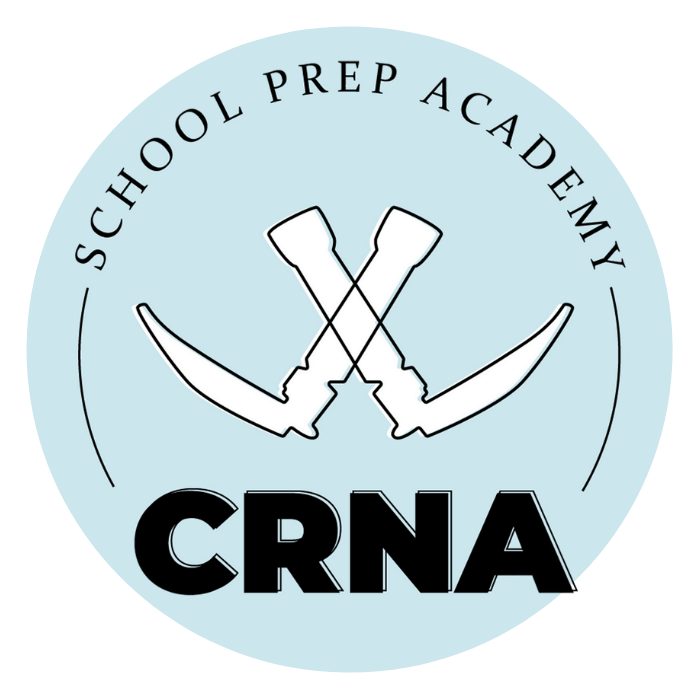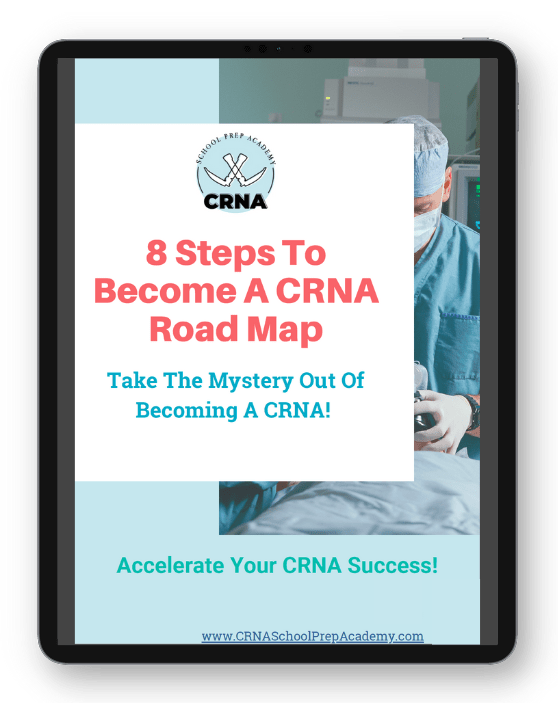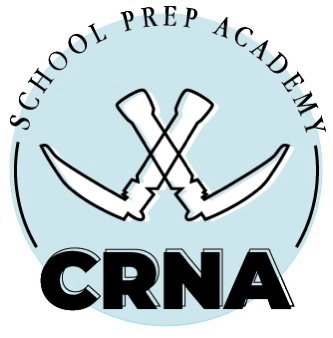
We all take tests intending to pass them the first time, especially in the CRNA space, where certifications are tough to earn but worth it for our career journey. If you are looking to ace your CCRN examination, this episode is perfect for you! The guru of CCRN, CMC, and CSC, Nicole Kupchik, is with Jenny Finnell to share with us all we need to know about CCRN. How do you qualify to take it? When can you take it? How can we improve our odds of passing the test? Nicole lays down the answers and more! Well-recognized for her review courses, she brings over to us some of her wisdom to help us ace our CCRN exam. So tune in to not miss out!
Get access to planning tools, valuable CRNA Faculty guidance & mapped out courses that have been proven to accelerate your CRNA success! Become a member of CRNA School Prep Academy here:
https://www.crnaschoolprepacademy.com/join
Book a mock interview, personal statement critique, resume review and more at https://www.TeachRN.com
Join the CSPA email list: https://www.cspaedu.com/podcast-email
Send Jenny an email or make a podcast request!
Hello@CRNASchoolPrepAcademy.com
—
Watch the episode here
Listen to the podcast here
Getting The CCRN For CRNA School With Nicole Kupchik
In this episode, we’re going to talk about all the ins and outs of getting your CCRN with a special guest. Let’s go ahead and get on the episode.
—
Before we do, some exciting news is that we launched Nurses Teach Nurses- Now Called TeachRN!. This is a custom-built platform that is going to allow you to get the mentor services you are looking for, such as mock interviews, resume edits and personal statement edits. We have the ability to expand how many service providers we have, as well as how many services we can offer.
This is separate from CRNA School Prep Academy, which is going to give you more possibilities. You can even become a service provider. You can apply right there on the platform to be a service provider. If you want to give back to an ICU nurse who is looking to ramp up their resume for an ICU position, you can do that. I hope you check out TeachRN. Head over to TeachRN.com to explore the possibilities.
—
We have a special guest, Nicole Kupchik, who owns Nicole Kupchik Consulting. She’s the guru in the space of CCRN, CMC and CSC. If you are looking for a way to get the best of the best review course to get your CCRN, this is by far my biggest recommendation. Nicole has been highlighted in our community over the last several years, shouting from the rooftops how excellent her educational courses are. Welcome to the show, Nicole. I’m so happy to have you.
Thanks for having me, Jenny.
The CCRN is our topic for this episode. We are going to discuss what it is you need to know about the CCRN as far as when you can take it and how you qualify to take it, things of that nature, as well as someone who educates and teaches this topic, some things you should know to better improve your odds at passing a test on the first attempt. Everyone’s goal is to take this test once and not have to repeat it. Let’s go over the requirements to take the CCRN.
CCRN Requirements
The CCRN is administered by the American Association of Critical-Care Nurses. To sit for the exam, you have to work 1,750 hours within 2 years. A lot of people misread that. They think you have to be a nurse for two years to sit for it and that is not true. If you work full full-time then you probably hit the hours required within the first year, 1,750 hours; if you have been working for at least 5 years in critical care, you only need 144 hours in the most recent years as long as you have worked 2,000 hours. I have been doing this for a while and it still works for DM. I’m able to keep my certifications current because of the 144 hours. They added that a few years ago and it was a great addition to allow nurses who aren’t working full-time to still keep their certifications.
I do find that when you are working 36 hours a week, you hit that benchmark right around your first year. If you are working overtime, you could hit it sooner. Many of you are equally working more than 36 hours a week. Keep in mind that it is not one or the other. It is whatever comes first. For those of you who are part-time, it is okay to be part-time but let me reference it since this is for CRNA school programs, this was a recent question in our community about working part-time: Most schools want to see you working full-time.
If you have been part-time, it is in your best interest to go back full-time to the ICU. When you are considering all the other candidates, you are applying up against them and if you are part-time, especially if it has been for several years, I believe the student had been part-time for at least six years, the schools are going to have a problem with that. This was commented on by the CRNA faculty themselves. I want to at least put that out there, if you are part-time, to venture back to full-time for your CRNA application, at least for the year preceding your application. Thank you so much for clarifying that.
Another thing too I would love to talk about as far as the requirement is something that I stumbled upon because I saw a lot of students doing this and asking me this question. They were like, “Jenny, at the time I sit for the test, I will meet the hour requirements but not at the time of application.” I emailed the AACN because we had some courses through them and I have a contact. I was like, “I keep getting this question and I want to make sure I’m answering it the right way.” The answer was no. You have to have the 1,750 hours at the time of application, not at the time of testing. Keep that in mind as well. Can we talk maybe a bit about ICU requirements? That is also a gray area. Is it a rural-specific ICU or a step-down through ICU?
One of the ideas in critical care is a state of health versus a place. For example, the cath lab sees critically ill patients. A lot of cath lab nurses take the CCRN. It is the same with PACU. If a nurse works step down like IMCU progressive care tele, there is a different exam for them and it is called the PCCN exam. Working in an area where you take care of critically ill patients is key. A lot of non-strict ICU-type nurses take the exam. Emergency nurses take the CCRN exam frequently because they have critically ill patients in their areas. It does not specify what type of ICU it has to be.
A lot of nurses don’t know they want to do CRNA. A lot of nurses get exposed to anesthesia while working in places like the cath lab, PACU or the ER. They see anesthesia come to the bedside to do central lines or they speak to them a lot in PACU. I loved my cath lab nurses. They were good at holding airways because a lot of those doctors had sedation privileges. They would get cases over there that weren’t involved with anesthesia. They were highly trained nurses.
You can work on your CRNA while you are in that position but be sure to venture into the actual ICU before you apply to CRNA school. I get asked frequently if things like cath lab, PACU or pre-op count. They don’t. ER is one of those questionable units mostly because most schools don’t see ER as the long-term management of ICU patients.
They should come to take a visit to the hospitals with all the backups.
Some hospitals have holding areas in the ER for ICU patients. I had a student come to me and they were like, “I don’t understand.” There is an ICU holding area in the ER but the program that they were applying to didn’t want to accept that. Check with your program first before you settle on that area. Thank you for that. What is the CCRN as far as what categories are you tested on and is it also weighted?
CCRN Categories & Test Taking Tips
They do an 80/20 split. 80% of the exam comes from an area called clinical judgment and 20% comes from an area called professional caring and ethical practice. I honestly find the professional caring and ethical practice questions a little bit challenging to study because they will give you a situation. You got to pick the best answer when two of them could be fine, acceptable things to do.
80% of clinical judgment includes 18% cardiac and 17% pulmonary. They clump together endocrine, hematology, renal, GI and integumentary which accounts for 20% of the exam. They clump together neurology, musculoskeletal and psychosocial which account for 13% of the exam and 14% is multisystem. That all makes up 80% of the exam and 20% is professional caring and ethical practice.
The type of test that nobody likes in nursing school is to select the best answer.
One of the cool things about the exam and when I teach review courses, I go over a lot of what to expect, but I thought the NCLEX had gotten a little bit psycho. I’m pretty sure it is gotten a little cuckoo. I always tell nurses, “This is not that type of exam. They are not trying to trick you. They are legitimately trying to assess your knowledge.” They got rid of questions that are stated like this. All of that is true except get rid of those types of questions.
There is no multi-select, all of the above or none of the above. It is content, a question, four options, A, B, C and D and only one is the answer. When you got a question and you are stuck between two answers, say to yourself, “If I could only do one thing, what would be the most important one thing I could do?” That is a good strategy for answering a lot of the questions on the exam.
If you're stuck between two answers, choose the one most important thing you can do. Click To TweetThere are at least a few questions that you are like, “I like both those options.” What I do is take all my tests this way. Ever since I figured out my routine in undergrad when I wasn’t getting good grades and I wanted to get good grades, I started routinely practicing reading the question, not looking at the answers and determining the answer before I read the options.
One of my test-taking strategies is to tell nurses, “Don’t read the answers. They warm up with your hand. Guess the answer and if it is there, choose it and move on.” Nurses can psych themselves out and the exam is tough. You have to go in prepared. One of the things I always do in class is to make people hold up their pinkies and pinky swear that they will not change their answers. How many times have you ever walked into a patient’s room and were like, “That patient doesn’t look good?” You may not say that but you are thinking it in your head.
We’ve got a good gut instinct. I tell nurses the same thing, “Use your gut, look at the question and think about what the answer is. If it is there, choose it and move on. Do not go back to that question.” When I talk to nurses who don’t pass, it is usually by 1 or 2 points and everyone has the same thing in common. They change their answers. I always tell nurses, “If you are not sure, skip it.” You can navigate the exam however you want. I am superstitious. I never start with question one. I always start with question 50. I have adult-onset ADD, I’m pretty sure. I self-diagnosed but I hop around five questions at a time until it is done.

If you don’t know an answer, sometimes it helps to continue going down the test to other questions because it can jog your memory and you can be like, “I know the answer to this question.” It helps me jog my memory to answer the other question. It can allow you to get clearer on maybe what the answer could be.
The other thing too I found is you will find answers to some questions in other questions. Don’t change your answers. You have to all promise.
It is hard to pinpoint any one area but I’m sure everyone is wondering about this question so we are going to ask about it. If you had to pick an area that nurses tend to struggle with within the exam, what would it be if you had to say there was an overarching theme or it varies?
It does vary depending on what area nurses work in. I find cardiac is one of those areas. It is tough. Hemodynamics is part of cardiac. A lot of nurses work in units that don’t even look at hemodynamics anymore. It makes me insane that we’ve given up hemodynamics clinically and think we can go into the room like, “This is what they need.” That is BS.
I feel like nurses don’t see pulmonary artery catheters. They don’t understand hemodynamics. I always ask in class, “How many of you have never taken care of a patient with a pulmonary catheter?” Usually, over half the class raises their hand. In cardiac surgery areas, CCUs or cath labs, nurses are seeing PA caths. Otherwise, they don’t understand hemodynamics. I’m hoping that changes as LiDCO and flow track. The arterial line technologies are becoming more widely accepted. We’ve got noninvasive technologies that have some clinical outcome data. Hemodynamics and cardiac is one section where nurses freeze if they haven’t worked in those areas.

These happen to be two areas that are incredibly important for CRNA. That is probably the most important aspect and concept that they will drill you on during the interviews, that you will also be drilled when you are in CRNA school and expected to know like the back of your hand while you are practicing anesthesia.
Everybody has a heart. Cardiac is pertinent for every type of case. If you are not exposed to a cardiac ICU and if you think about it, there are always ways to understand cardiac physiology depending on whatever ICU you are working in. You have to choose to do it. If someone’s in a thyroid storm, understand why they are tachycardic. What does it mean to be tachycardic? What does it do to their diastolic pressure when you are tachycardic? What does it do if you are preload or afterload?
Try to incorporate different cardiac things into technically noncardiac patients. Like when I was in the NICU, a lot of them were septic. That plays a role in your cardiac. What happens to your whole vascular system at that point? What does it do to your hemodynamics? If you lead into all your patients no matter what ICU, even neuro-wise, why do they get bradycardic? Why do neuro patients get bradycardic when their ICP is high? You should understand those concepts. That could be an area, especially since you said it was 18% of the test.
Cardiac and pulmonary are 35% of the exam. You need to go into those areas well prepared for sure.
That is also why CRNA schools heavily rely on the CCRN vetting technique for their applicants. Another thing to point out with CCRN is don’t just take it. It makes me cringe whenever people are like, “I’m going to wing it and see if I pass. If I don’t, I will pay for some study” I’m like, “Don’t do that.” Here is why. Some of your schools will want to know your score and if you had to take it more than once and you failed, they are going to want to know both those scores. Why would you ever lead by going into it that you may fail? Set yourself up for success. Not only is it going to be a confidence booster but it will show the schools that you took it seriously. Hopefully, you will take CRNA school seriously.
The main thing you get out of this journey of getting certified is that you learn. Your knowledge is going to increase. By sitting down, studying and reviewing content and material, you are going to learn. Your knowledge is going to expand and that will help your patients clinically. That is the thing. I get a little cringy when nurses say that to me because it is like you have cheated yourself by winging it. You might be able to wing it and you are fine. It all depends. It is a crapshoot because the questions are randomly drawn from big pools of questions. No two exams are the same.
It makes your job more rewarding. The more you understand what you are doing, it doesn’t make it seem like you’re just following orders. Another huge thing is when you have a good understanding of critical care concepts, you will know why that order is coming in. You will understand it to where you not only are more educated, you are a safer practitioner and it makes your career more rewarding. Another thing they’re for screening for an interview is do you follow orders or do you understand why they are asking for this lab or medication.
Test that if you are going to wing it. People say this for theory too but that one is okay. For me, the theory is one of those tests that work but equally so, it still costs money to take these tests. I always say, “No, I’m going to get a stroke.” I love to see if you have anything off the top of your head like fun mnemonics or acronyms that you like to share.
My whole class is full of them. I am not joking. The entire class is full of cheers and mnemonics. I have a mnemonic for everything. I’m not the smartest but I work hard. I have to have ways to remember things. For example, I got AEIOU, reasons that you would pull the trigger and do dialysis on a patient. A is Acidosis, metabolic acidosis. E is Electrolyte imbalances.
I go through the class doing all these mnemonics the entire time. We do cheers. We have the heart block cheer. If the Rs are from the P, it means you got the first degree. If it’s a long drop, it is a case of Wenckebach. If some Rs don’t get through, prepare to paste that Mobitz 2. If the Rs and Ps don’t agree, prepare to paste that third degree. The entire course is full of stuff like this.
When I’m live in class, I make everyone stand up and cheer with me. I always forget: If you are hyperkalemic versus hyperkalemic hypochromic example, where does that take your blood gas? One I have is if electrolytes are low, you will see metabolic alkalosis. Whereas if you drop acid, you get high. If your electrolytes are elevated, you will see acidosis. It is full of stuff like that.
I want to attend one of your courses. That sounds fun.
I get made fun of on TikTok. People will be like, “That is so elementary. That is childish. I can’t believe you are doing that.” I’m like, “If you want to go to a boring class, go. There are plenty of them out there.”
Why not pull on tools to help you? Some of it, you need to understand more than memorize. Some of it is relating things you learn to emotions. When you do something fun, like mnemonics, cheers and dances as you learn, you are creating emotion, which is joy, excitement and fun. As weird as it seems, it helps your memory and understanding because it will stay with your brain longer for whatever reason.
It triggers a different part of your brain. The other thing I do in courses is I will do audience following. You are being asked questions that trigger a different part of your brain.
When you are asked a question versus being told the answer, it allows you to think through and pull from what you already do know. You are a good teacher. That is awesome.
They have some fun.
Studying For The CCRN
This is going to be based on person to person but how long would you recommend for students to study and prepare before they take this test?
It is going to depend on how much experience they have and what type of area they work in. If you work in a pure burn unit, there are going to be some things you probably haven’t seen in a while that you are going to have to review. In general, most nurses need a minimum of 2 to 3 months of studying. If you are going to commit the time to take a review course, I highly recommend scheduling the exam within 2 months, maybe 3 at the most. Don’t let too much time go by.
If you take a review course, you are dedicating time to sitting and going through the content. Go take the exam. Don’t wait too long. Do it while everything is fresh in your mind. The one thing I tell nurses is it is the same way if you were to run a 5K, 10K, a half marathon or do something like that. If you have to train for this exam, you have to mentally train as well as cognitively train. I always recommend coming up with a test date, working your way backward and coming up with a calendar.
Don't let too much time go by if you take a review course. Take the test while everything's fresh in your mind. Click To TweetI always feel like a good hour multiple times during the week is probably better than saying, “I’m going to dedicate all day on Sunday to studying.” Little doses of content review are going to be far more productive than a whole day. You are going to retain a lot more. I always recommend nurses do lots of practice questions because if people come to class, I make them pinky swear that they will not deep dive into textbooks from that point forward. They are going to do practice questions and go back to the content that I give out in the class and look things over if they missed a question or something.
You can end up going down rabbit holes if you go back to textbooks and things like that. You’ve got to stay very focused on this exam. AACN publishes a test plan with an outline of what you could be tested on. Stick to it for the purpose of studying for the exam. Otherwise, you can waste hours going down rabbit holes of studying diseases that you can’t pronounce, let alone know what they mean.
You don’t need to watch every Khan Academy video. I don’t know how many times I had students get into CRNA school. The next thing you know, they were like, “I’ve got to watch every chemistry video I can find on YouTube.” I’m like, “No.” The amount of stuff you have to know about chemistry is this small. You are going to be looking at all of this and overwhelming yourself. It is similar to the CCRN. As Nicole said, “Sticking to the path works.” I like the small chunks and that allows time for consolidation. They always say, “When you sleep after a day of learning, your brain builds neurons and pathways with that knowledge that you can build upon even deeper the next day.” That is why that technique works.
This is a question I wanted to ask you because some of them are thinking, “If I get my CCRN, should I go get my CSC and CMC?” You don’t need alphabet soup so don’t focus on alphabet soup but focus on getting extra certifications in areas that you work on that will support your education or your learning on that unit. If that is the CSC and CMC, do it and the CCRN but don’t get it to get it.
It might make a nurse stand out in an interview to know not only did they get their CCRN but they work with cardiac surgery patients. They got a subspecialty certification in that area. If I were interviewing, which I have for other programs, not for CRNA, that would make you stick out a little bit more.
I have some that are like, “I don’t qualify for the CMC.” They get it anyways. I’m saying the big picture. If you have 100 certifications and you don’t know any one area incredibly well, they are going to test that and look at, “They have the certification. Let’s go down that pathway.” If you can’t answer some of those in-depth questions, they are going to say, “I want to make sure that if you are picking a home, whether that is the NICU, CVICU or cardiac, go all in on that unit and know it as best as you can that is your area of expertise.
I also have nurses who will ICU hop. They will think, “I started in the NICU. I’m going to go to the surgical ICU. I’m going to go to the CVICU so I can be well-rounded.” What that does, unfortunately, is deplete the knowledge and expertise you have in any one area and they want to see the in-depth knowledge versus a little bit of surface knowledge in all these different aspects. How would getting the certifications help you advance your ICU career if we look at, in general, advancing the ICU career path?
It increases your knowledge because it is a commitment when you take these exams. You need to study. I can’t tell you how many times I have gotten texts, messages or DMs saying, “You went over in class.” I had this patient I was able to have an educated stance. I always tell this story about anaphylaxis because I ran our code-blue committee for a lot. I had to follow up on things gone bad. We had a couple of times where nurses pushed code dose epi in anaphylaxis. One of them I tell the story about had an iatrogenic myocardial infarction because he had demand ischemia from 1 milligram of epinephrine from being pushed.
I always tell the story of making them do the RM. We like to do this whole mantra in class. We talk about why you give and what you give, like histamine blockers. I can think probably at least ten times off the top of my head I have gotten a message saying, “I was able to advocate for a patient because I knew it wasn’t coded dose epi. We were getting orders for coded dose epi and anaphylaxis.” The journey you go on to get certified increases your knowledge so you can be educated and advocate for patients. That is what it’s all about. One of the things I hear people say is, “I’m not going to get certified. That doesn’t make you a better nurse.” I beg to differ because an educated nurse is a better nurse.
I love that you said the fact that they got an order for that. That goes to show that many times, you will have an incorrect order.
We are all human too. What areas are used with anaphylaxis? It is not critical care to be quite frankly honest. It is EMS and emergency. Who is not used to dealing with anaphylaxis? ICU. We are not familiar with a lot of the orders or the medications that we give for anaphylaxis. One of the things I ended up doing from one of the cases that had iatrogenic MI is I created an anaphylaxis kit with big orange stickers and listed everything that was in the kit because we are not used to dealing with this. ER is used to it.
I had seen Stevens-Johnson syndrome but by the time they got to the MICU where I was, the crisis had already happened. As it unfolded before my eyes, it was when I was in anesthesia. It was probably the first time I saw it unfold before my eyes. It does not happen often but in my several years, a good handful of times, I have seen some type of reaction that we have to address in that.
The number one thing patients react to is contrast dye.
It is probably units like cath lab or interventional radiology.
You take your patient for a CT.
Is there a resource that you know of that they could look up, like the pathway for that? I always reference Stanford.
The Anaphylaxis guidelines were updated summer of 2022.
Where is that at?
Google anaphylaxis guidelines. You will find it right away. It is the national guideline. It is still epi 0.3 AM. H1 and H2 blockers. You got your diphenhydramine, Pepcid and steroids if needed. You can use nebulized epi. The guidelines are all out. When you are in the ICU and you see somebody whose eyes, lips and tongue are swelling you panic. That is how 1 milligram of epinephrine has been given many times in anaphylaxis because it is scary to see.
Speaking of that, we are calling another patient who had an anaphylactic reaction to Lisinopril and it was more like that angioedema.
It is a bradykinin reaction.
It is not anaphylaxis. It is that giant tongue where they lose their airway.
We give FFP, tranexamic acid and things like that for bradykinin mediated. That is one of the things we will go over in the CCRN. Is histamine or bradykinin mediated?
Those are our two different pathways and they look very similar. This is all great knowledge. Where can our audience connect with you? Where can they find you hanging out on the internet? Do you have TikTok?
I’m the granny of TikTok. I joined in July 2022 at the urging of my team. It is @NicoleKupchik. My Instagram is @NicoleKupchik. Facebook is Nicole Kupchik Consulting. I use YouTube as a holding place for a lot of videos that I do. I’m always shooting videos. There are a lot of videos on YouTube.
That would be a great place for you to go binge-watch Nicole. I would highly recommend that. Thank you so much.
Reels are probably the better place on Instagram or TikTok. I do a lot of shorts that are helpful for the exam.
Those are nice because it is short and sweet. Most people who are on the go need something quick to win. That sounds like great content. Thank you so much, Nicole, for coming to the show. I appreciate you so much. I hope you found this episode helpful. Enjoy and thank you for coming in.
Good luck to everyone. You got this and you can do this. Good luck with your CRNA programs and I hope to never see your face with a tube coming down my throat.
I hope that is not the case.
I got my colonoscopy exam in my 50s. I’m a fan of Propofol. I am the newest fan club member.
I’m glad you enjoyed it.
It was the best nap I have had in a long time.
Thank you so much, Nicole. It is always an honor and pleasure to be with you. You take care.
For More on the CCRN and Other Certifications for CRNA School, Click Here
Important Links
- Nicole Kupchik Consulting
- American Association of Critical-Care Nurses
- Khan Academy
- @NicoleKupchik – TikTok
- @NicoleKupchik – Instagram
- Nicole Kupchik Consulting – Facebook
- YouTube – Nicole Kupchik
- Info@KupchikConsulting.com
- https://www.CCJM.org/content/89/2/106
About Nicole Kupchik
 Nicole Kupchik, MN, RN, CCNS, CCRN-CMC, PCCN-K, has been a Critical Care RN for over 25 years. She uses her knowledge and expertise to arm nurses around the country with tools to create safe work and practice environments.
Nicole Kupchik, MN, RN, CCNS, CCRN-CMC, PCCN-K, has been a Critical Care RN for over 25 years. She uses her knowledge and expertise to arm nurses around the country with tools to create safe work and practice environments.
Her casual style sets the tone for a relaxed, fun & interactive learning environment. Find out how Nicole can help you.
Get access to planning tools, valuable CRNA Faculty guidance & mapped out courses that have been proven to accelerate your CRNA success! Become a member of CRNA School Prep Academy here:
https://www.crnaschoolprepacademy.com/join
Book a mock interview, personal statement critique, resume review and more at https://www.TeachRN.com
Join the CSPA email list: https://www.cspaedu.com/podcast-email
Send Jenny an email or make a podcast request!


